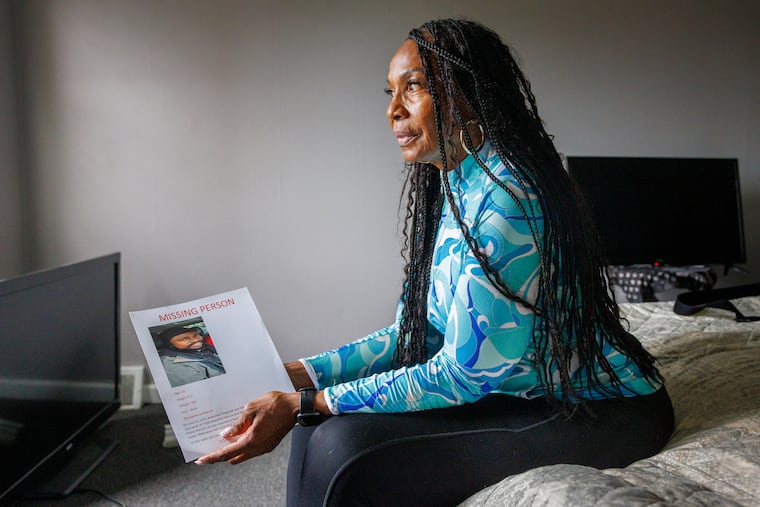Carlee Russell’s disappearance was a hoax. Alexander Fitzgerald’s disappearance is real.
Media attention helps, and too many cases of missing people of color don't get enough.

In the days since the disappearance of a Black Alabama woman was determined to be a hoax, missing persons advocates are pleading with the public not to let one woman’s lies distract from the thousands of legitimate cases of missing people of color that never make the headlines.
This is one of those cases.
Claudia Fitzgerald knows that her son does not fit the description of someone whose disappearance usually garners much attention.
He’s Black.
He’s a grown man.
He’s 33. And he’s someone who experiences mental health problems.
A neighbor told police that he spotted Fitzgerald’s son, Alexander Fitzgerald, walking near the 7200 block of Haverford Avenue in West Philadelphia on June 21 with two Black men that the neighbor did not recognize.
Alexander hasn’t been seen since.
Fitzgerald is a retired school district employee who said that on the day Alexander disappeared, she had been at the hospital with her daughter, who was giving birth to her first grandchild. When she came home that day, she said she started to worry. Alexander’s key was still in the door of the home they share, she recalled. The door was slightly ajar, Fitzgerald said, but her son was nowhere to be found.
Despite her concerns, Fitzgerald didn’t want to treat her adult son as a child, so she waited the recommended 48 hours before going to the police, hoping he’d pick up his phone or eventually come home.
“He is 33, so maybe he met a young lady,” she told me when we talked. “These are things that I was thinking. I didn’t want him to be out on a date, and the police to come in.”
The police officer who came to her home a couple of days later to take the initial report was blunt: Underage children are the priority when it comes to missing persons cases, she recalled him telling her.
And while she could understand that, she told him there were reasons to worry about her grown son.
Alexander was a “trusting, maybe too trusting” young man who developed mental health issues in adolescence that called for medication that he still takes.
He has a routine from which he almost never strays: Every day he goes to a nearby gym and then comes home — some days maybe later than others, but he is never gone for long periods of time.
“He always picks up his phone, or calls,” she said.
For the first day or two after he didn’t come home, her calls went to his voice mail. Now, the call doesn’t even connect.
The last time Fitzgerald spoke to the detective on the case, he didn’t seem to be making much progress. So, she hired a private investigator. Greg Singleton is a retired Philadelphia homicide detective who has worked his share of missing persons cases, including the 2005 case of LaToyia Figueroa, a young pregnant West Philly mother whose body was later found in a wooded lot in Chester.
He knows firsthand there are times when adults don’t want to be found. But when that’s not the case, he said “it’s usually not good.”
He also knows something else: “Media attention helps,” he said, and too many cases of Black and brown people don’t get enough. Figueroa — who was Black and Hispanic — disappeared around the same time as Natalee Holloway, a white American teen who had gone missing in Aruba. But while Holloway’s disappearance dominated the headlines, Figueroa’s story didn’t get national attention until a local blogger criticized major networks for ignoring the story.
Singleton has been in touch with the police — who told me this week that detectives are still actively investigating Alexander’s disappearance — and has urged them to check Alexander’s bank and phone records.
He peppered the area with missing posters, secured video from where Alexander went missing, and talked to friends and neighbors. He’s searched for him all over the neighborhood, on construction sites, even in Kensington, a neighborhood known for drugs that Alexander wandered into a few months ago before promising to never go back again.
When I first talked to Fitzgerald last week, I told her that I hoped by the time this column was ready to publish, she’d call to say Alexander was home and safe.
But when we talked again recently, she was still in the dark, and Singleton was coming up empty.
Fitzgerald worried that the lies told by Carlee Russell, the Alabama woman who admitted Monday her kidnapping story was a hoax, might affect other families desperate for attention for their missing loved ones.
So she asked me to convey a few things to anyone reading this.
“Please,” she said, weeping, “just illustrate the fact that he is a kind, young man. And generous, and forgiving, and trusting. I mean, nobody’s perfect, right? But he was a peacemaker, not a troublemaker.”
And then she added one more thing she wanted people to know.
“This is real,” she said.